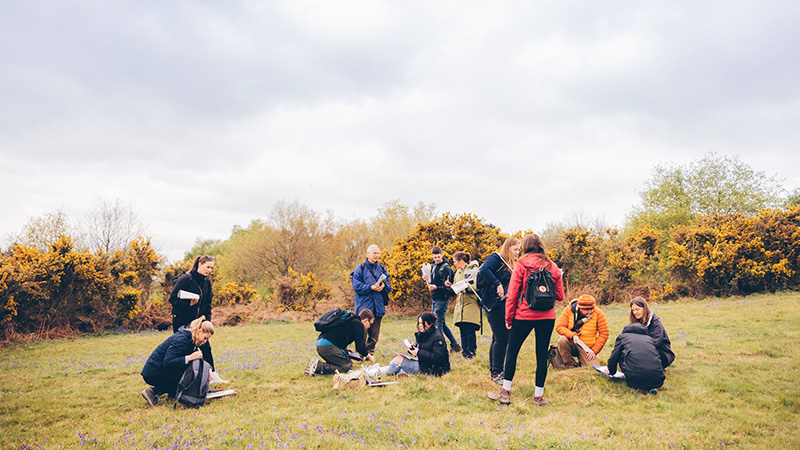Conservation Ecology
MSc or PGDip or PGCert
UCAS code: P035706
Start dates: September 2026
Full time: MSc: 12 months, PGDip: 8 months, PGCert: 8 months
Part time: MSc: 24 months, PGDip: 20 months, PGCert: 8 months
Location: Headington
School(s): School of Biological and Medical Sciences
Overview
Global ecosystems are battling for survival. For decades, human activity has caused our planet untold damage. But there’s hope. We believe that a different kind of human activity can save it.
Our MSc Conservation Ecology degree gives you the skills to tackle the urgent global ecological crisis. Our lecturers, with their real-world experience, will prepare you for a rewarding career that requires strong species identification, ecology, technology, and communication skills.
Conservation needs a diversity of passionate, innovative and motivated people. So this course welcomes those with a science background and those looking for a career change. You are also welcome if your background is in:
- the medical profession
- journalism
- business
- social sciences
- humanities; or other areas.
You’ll have the opportunity to gain translatable skills that can make a valuable contribution to conservation.
Join us and be the change you want to see in the world.

Why Oxford Brookes University?
-
Research excellence
We offer opportunities to conduct outstanding and inspiring research. 95% of our research in Biological Sciences is internationally recognised.
-
CIEEM accreditation
This accreditation by the Chartered Institute of Ecology and Environmental Management shows that the course promotes the highest standards of practice. Successful completion of this course makes you eligible for graduate membership to CIEEM.
-
Strong industry links
We have strong links with domestic and globally significant conservation and ecological organisations.
-
Access to outstanding environmental sites
You'll have access to a variety of natural and managed landscapes including the exceptional habitats of the world-renowned Wytham woods.
-
Extensive networking opportunities
You will engage with external organisations to fulfil curricula and project activities. You will have the opportunity to be involved with natural history museums, botanic gardens, recording schemes, government and charity organisations, including our network of land managers and practitioners.
-
Accreditation(s)
The Chartered Institute of Ecology and Environmental Management
Course details
Study modules
The modules listed below are for the master’s award. For the PGDip and PGCert awards your module choices may be different. Please contact us for more details.
Please note: As our courses are reviewed regularly as part of our quality assurance framework, the modules you can choose from may vary from those shown here. The structure of the course may also mean some modules are not available to you.
Research
Our Centre for Ecology, Environment and Conservation is developing the use of mobile applications for data collection and processing in the field.
Research in the following areas is undertaken via the Centre for Ecology, Environment and Conservation:
- invertebrate ecology and biogeography
- evolutionary developmental biology
- spatial ecology and land use
- evolution of animal development and morphology.

Careers
This course is a vocational, work-ready master’s designed to fulfil the current requests from industry. As a graduate of this degree, you’ll be highly prized by employers in the ecological monitoring and conservation industry. Your unique skill set of national and international policy, statistical and mapping tools, identification, and ecological monitoring will be invaluable to different types of organisations.
Popular job roles include:
- conservationist
- ecologist
- environmental consultant
- field trial officer
- researcher
- geospatial analyst
- biosecurity officer
- environmental educator
- collection manager
- teacher
- lecturer.
Graduates have gone on to work for environmental consultants, the Royal Society for the Protection of Birds (RSPB), Natural England, the Environment Agency, DEFRA, natural history museums, wildlife parks, forestry organisations, NGOs, or created their own consultancies.
Student profiles
Entry requirements
Specific entry requirements
Applicants are usually expected to have (or be about to attain) at least a second class honours degree in a related scientific subject from a recognised institution of higher education. If you do not have these academic qualifications, you could still be offered a place on this course if you can show evidence of the potential to succeed based on professional and/or related experiences.
Please also see the University's general entry requirements.
English language requirements
For applicants whose first language is not English, an Academic IELTS score of 6.5 (with 6.5 in Reading and Writing, and 6.0 in Listening and Speaking) is required.
Please also see the University's standard English language requirements.
Pathways courses for international and EU students
We offer a range of courses to help you meet the entry requirements for your postgraduate course and also familiarise you with university life in the UK.
Take a Pre-Master's course to develop your subject knowledge, study skills and academic language level in preparation for your master's course.
If you need to improve your English language, we offer pre-sessional English language courses to help you meet the English language requirements of your chosen master’s course.
English requirements for visas
If you need a student visa to enter the UK you will need to meet the UK Visas and Immigration minimum language requirements as well as the University's requirements. Find out more about English language requirements.
Terms and conditions of enrolment
When you accept our offer, you agree to the Terms and Conditions of Enrolment. You should therefore read those conditions before accepting the offer.
International qualifications and equivalences
How to apply
Application process
Tuition fees
Questions about fees?
Contact Student Finance on:
Tuition fees
The following factors will be taken into account by the University when it is setting the annual fees: inflationary measures such as the retail price indices, projected increases in University costs, changes in the level of funding received from Government sources, admissions statistics and access considerations including the availability of student support.
How and when to pay
Tuition fee instalments for the semester are due by the Monday of week 1 of each semester. Students are not liable for full fees for that semester if they leave before week 4. If the leaving date is after week 4, full fees for the semester are payable.
- For information on payment methods please see our Make a Payment page.
- For information about refunds please visit our Refund policy page
Financial support and scholarships
Additional costs
Please be aware that some courses will involve some additional costs that are not covered by your fees. Specific additional costs for this course are detailed below.
Programme changes:
On rare occasions we may need to make changes to our course programmes after they have been
published on the website. For more information, please visit our
changes to programmes page.


